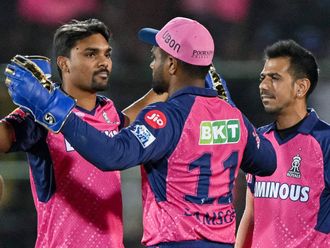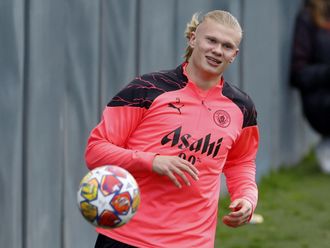Two years after their Ryder Cup meltdown at Medinah Country Club, the US team keeps looking for reasons to believe in a brighter day.
No Tiger Woods in the lineup this time around at Gleneagles? Well, didn’t the Americans’ only victory over the Europeans in recent years come when Woods did not play in 2008?
No victory on the road since 1993? Re-enter Tom Watson, the baritone-voiced, sun-wrinkled US captain and Scotophile who led that 1993 team.
Ted Bishop, the PGA of America president who recruited Watson, was even moved last month at the PGA Championship to find a silver lining in the European star Rory McIlroy’s latest victory.
“The last time that a European player won the Open Championship and PGA Championship in the same year, the United States won the Ryder Cup, and that was in 2008, when Padraig Harrington accomplished that same feat,” Bishop said. “So, on behalf of Tom and our entire Ryder Cup team, I want to thank Rory McIlroy for winning and setting a stage for the United States victory in September.”
It has been a long period of adjustment for the American golf establishment, which once had a firm grip on Samuel Ryder’s Cup. But there can be no denying that this is a European-dominated competition now (the Europeans have won seven of the last nine) and also no denying that the Ryder Cup remains, despite the Eurocentric honour roll, one of the consistently best competitions in international sports.
Nerve-janglers
It seemed that its great, suspenseful run was ending when the Europeans romped to lopsided, nine-point victories in 2004 at Oakland Hills near Detroit and in 2006 at the K Club in Ireland. The Americans, inspired by Paul Azinger, a resourceful captain, won convincingly, too, in 2008.
But the last two editions were back to being classic nerve-janglers, brimming with chutzpah and chokes, and they shared the same ending: 14.5-13.5 victories for Europe.
In 2010, at rain-soaked, mud-spattered Celtic Manor in Wales, it came down to the final singles match, in which Graeme McDowell closed out Hunter Mahan on the 17th hole.
In 2012, with the Americans holding an imposing six-point lead early on the final day at Medinah, it came down to the second-to-last singles match, in which Martin Kaymer sank a 5-foot putt on the 18th hole to beat Steve Stricker. That finished off, depending on one’s perspective, the most remarkable comeback or collapse in the Cup’s 85-year history.
European golf fans called it the Miracle at Medinah. American fans, including the tens of thousands reduced to silence on site that Sunday, would probably prefer to forget the whole thing.
Regardless, it should make Watson’s motivational task easier at Gleneagles in his beloved Scotland.
“We’re not going to Gleneagles to have a nice time,” he told Golf Digest. “We’re going there to bring back the Ryder Cup. Win at all costs, basically. We’re taking charge. I want players who hate losing as much as I do. No, more than I do. And I think I’ve got them.”
Such intangibles seem essential in light of the Europeans’ much greater familiarity with Gleneagles and even more essential given the world rankings. The Europeans had four in the top six the week before the Cup, led by McIlroy, who is back at No. 1 after winning his two latest major titles this year. They also have Sergio Garcia, back at No. 3, who has yet to win a major but routinely saves some of his finest golf for the Ryder Cups. They have Henrik Stenson at No. 4 and Justin Rose at No. 6.
American absences
The Americans are without the injured Woods, no longer the Woods of yore even when ambulatory. They are also missing Dustin Johnson, the big-hitting intimidator who was undefeated at Medinah. Jason Dufner, last year’s PGA champion, is also injured. And the team is without the two American golfers with the hottest hands in recent weeks: Chris Kirk and Billy Horschel, who both peaked after Watson had named his three captain’s picks: Keegan Bradley, Webb Simpson and Mahan.
Watson still has ample talent at his disposal, including two-time Masters winner Bubba Watson and his friend Rickie Fowler, who has had a remarkable year of nearly winning majors.
The United States has a fiery and fast-emerging talent in Jordan Spieth. It also has familiar veterans like Phil Mickelson and Jim Furyk, who is back to No. 5 in the world at age 44. But that pair could also set a collective record for Ryder Cup scar tissue.
The truth is, the Americans have been highly motivated plenty of times only to fall short. Merely wanting it, even craving it, will not be sufficient no matter how many earnest, history-infused clubhouse speeches Tom Watson delivers.
— New York Times News Service








